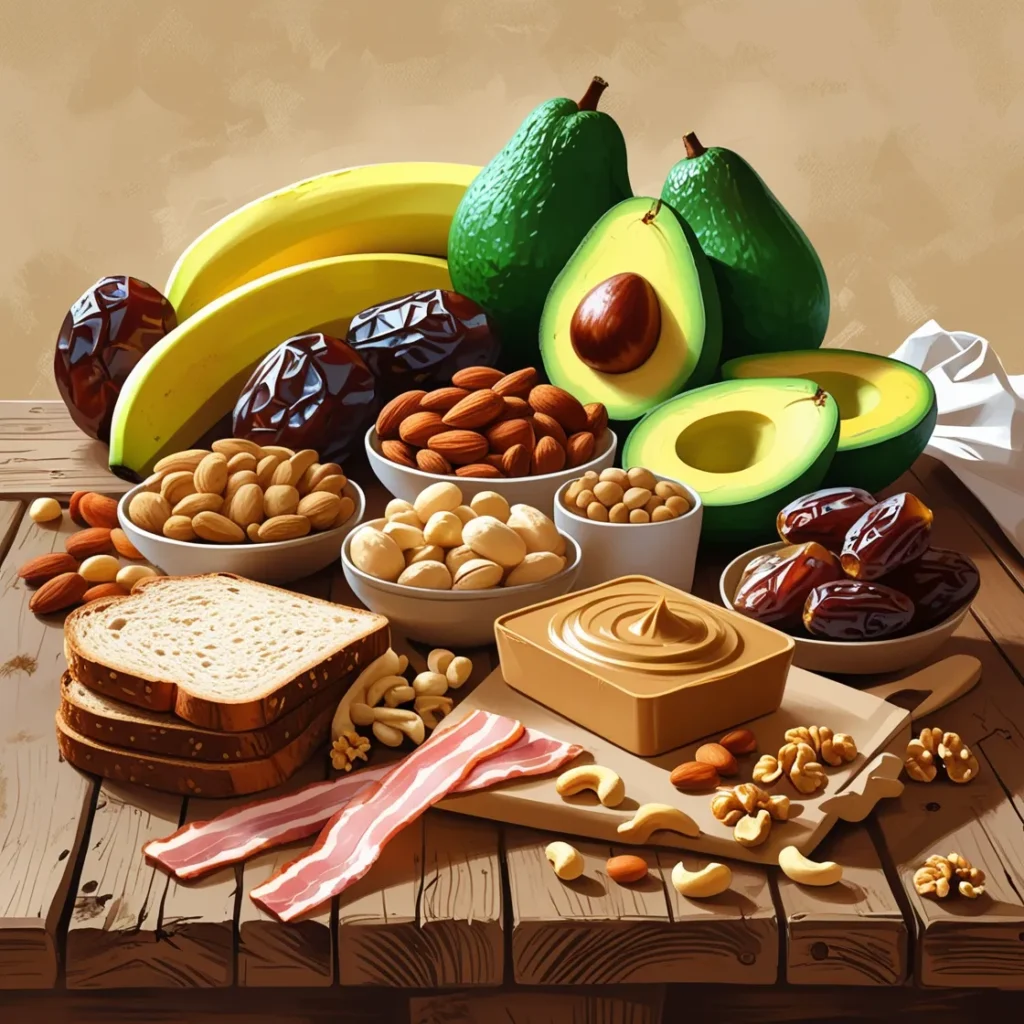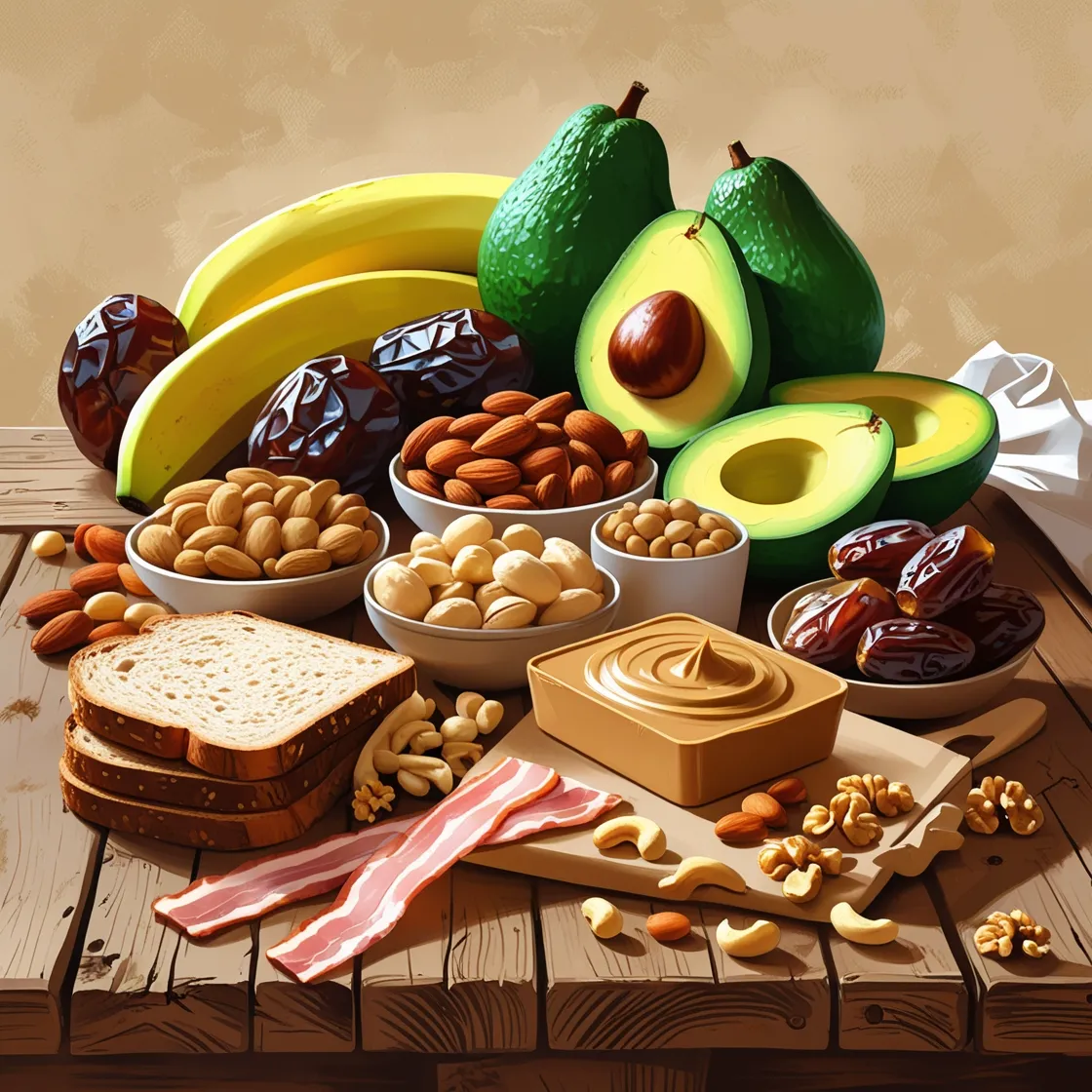Best Foods for Healthy Weight Gain
Effective Weight Gain Diet Plan
Best Foods for Healthy Weight Gain. To gain weight healthily, focus on a calorie surplus with nutrient-dense foods. Below is a structured approach based on expert recommendations:
Core Principles
- Calorie Surplus: Consume 300–500 calories above maintenance for steady gain; 700–1,000+ for faster results.
- Macronutrient Balance: Prioritize proteins, complex carbs, and healthy fats.
- Meal Frequency: Eat every 3 hours (5–6 meals/day) to meet calorie goals.
Foods to Prioritize
- Proteins: Chicken, fish, eggs, Greek yogurt, and lentils.
- Healthy Fats: Avocado, nuts, seeds, olive oil.
- Complex Carbs: Whole grains (oats, brown rice), sweet potatoes, quinoa.
- Calorie-Dense Snacks: Nut butter, dried fruit, dark chocolate
Sample Meal Plans
Pakistani-Inspired Plan 4
- Breakfast: Bran bread, banana-date-almond shake, boiled egg, nuts.
- Mid-Morning: Apple with peanut butter or sweet potato chaat.
- Lunch: Whole-wheat roti, chicken/fish, salad, yogurt.
- Evening: Nuts and dark chocolate.
- Dinner: Repeat lunch with added lentils or rice.
3-Day International Plan 5
| Meal | Day 1 Example | Day 2 Example | Day 3 Example |
|---|---|---|---|
| Breakfast | Coffee + whole-wheat sandwich with egg | Milk + tapioca with chicken/cheese | Smoothie + chicken omelet |
| Snack | Peanut butter biscuits + almonds | Avocado-egg sandwich + banana | Oatmeal + nuts |
| Lunch | Chicken stroganoff + rice + salad | Pasta with tuna + veggies | Meatballs + mashed potatoes + broccoli |
| Dinner | Similar to lunch | Similar to lunch | Similar to lunch |
What are the best calorie-dense foods for weight gain
Best Foods for Healthy Weight Gain. The best calorie-dense foods for weight gain are those that pack a high number of calories and nutrients into relatively small portions, making it easier to achieve a calorie surplus without feeling overly full. Here are the top options, supported by expert sources:

Nuts and Nut Butters
- Almonds, walnuts, cashews, peanuts, and their butters are rich in healthy fats, protein, and calories. Just a handful or a couple of tablespoons can add hundreds of calories to your daily intake.
Dried Fruits
- Raisins, dates, apricots, figs, and other dried fruits are concentrated sources of natural sugars, fiber, and calories. They make excellent snacks or additions to yogurt and oatmeal.
Full-Fat Dairy
- Whole milk, cheese, full-fat yogurt, and cream provide protein, fat, and a significant calorie boost. Greek yogurt and cheese are particularly calorie-dense.
Red Meat and Fatty Fish
- Beef, lamb, pork, salmon, mackerel, and sardines are high in protein and fat, supporting both weight and muscle gain.
Avocado
- Avocados are loaded with healthy fats and calories, with a single large avocado providing over 300 calories.
Whole Grains and Starches
- Rice, quinoa, oats, whole-grain bread, and potatoes are high in complex carbohydrates and calories, especially when prepared with added fats like olive oil or butter.
Healthy Oils and Fats
- Olive oil, coconut oil, and other plant-based oils are pure fat and extremely calorie-dense. Adding a tablespoon to meals can easily increase calorie content.
Protein Smoothies and Shakes
- Homemade shakes with milk, nut butter, fruit, and protein powder can provide 400–600 calories or more per serving.
Granola and Trail Mix
- Granola made with oats, nuts, seeds, and dried fruits, or trail mix, are high-calorie snacks that combine several calorie-dense ingredients.
Dark Chocolate
- High in calories and healthy fats, dark chocolate is a good occasional treat for weight gain.
How to Use These Foods
- Add nuts or nut butter to oatmeal, smoothies, or yogurt.
- Snack on dried fruit or trail mix between meals.
- Use whole milk or cream in coffee, cereal, and cooking.
- Incorporate avocado into salads, sandwiches, or as a spread.
- Cook grains and vegetables with healthy oils or butter for extra calories.
Focusing on these foods, combined with regular strength training, can help you gain weight in a healthy and sustainable way.
How do I balance my diet to gain weight healthily
To gain weight healthily, balance your diet by focusing on both calorie surplus and nutritional quality. Here’s how to approach it:

Key Principles for Healthy Weight Gain
- Increase Calories Gradually: Aim to add 300–500 extra calories per day for steady, healthy weight gain.
- Prioritize Nutrient-Dense Foods: Choose whole grains, lean proteins, healthy fats, fruits, and vegetables to ensure you get essential vitamins and minerals along with calories.
- Balance Macronutrients:
- Proteins: Include sources like lean meats, fish, eggs, beans, pulses, and dairy in every meal to support muscle growth and repair.
- Complex Carbohydrates: Opt for whole grains, starchy vegetables, and legumes for sustained energy.
- Healthy Fats: Add avocados, nuts, seeds, olive oil, and oily fish for concentrated calories and essential fatty acids.
- Eat Regular Meals and Snacks: Consume 5–6 smaller meals or snacks throughout the day to increase calorie intake without feeling overly full.
- Add Extra Calories Smartly: Boost meals with calorie-dense additions like cheese, nuts, seeds, and healthy oils rather than sugary or processed foods.
- Stay Hydrated: Drink plenty of fluids but avoid filling up on water right before meals to help maintain your appetite.
- Limit Processed and Sugary Foods: Avoid relying on junk food, sugary snacks, and drinks, as these can lead to unhealthy fat gain and negatively impact cholesterol and overall health.
- Incorporate Strength Training: Combine your diet with regular resistance exercise to promote muscle gain rather than just fat.
Sample Daily Structure
- Breakfast: Oatmeal with nut butter, fruit, and full-fat milk.
- Snack: Greek yogurt with honey and seeds.
- Lunch: Grilled chicken, brown rice, roasted vegetables, and olive oil.
- Snack: Trail mix (nuts and dried fruit) or whole-grain crackers with cheese.
- Dinner: Salmon, quinoa, avocado, and steamed greens.
- Evening Snack: Cottage cheese with berries or a peanut butter sandwich.
Additional Tips
- Meal Prep: Prepare calorie-dense foods in advance (e.g., batch-cook grains, roast nuts, portion snacks).
- Monitor Progress: Adjust portions and calories based on your weight changes and goals.
- Consult a Professional: If you have specific health concerns or struggle to gain weight, seek guidance from a registered dietitian
The “That feeling when knee surgery is tomorrow” meme, also known as the Blue Grinch meme, expresses a specific emotional state associated with a pending knee surgery.
Weight Gain Diet Plan—5 FAQs






